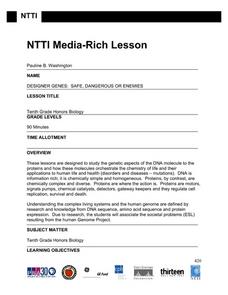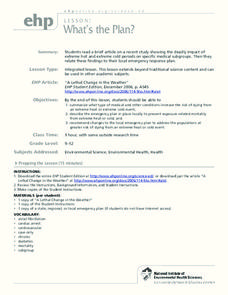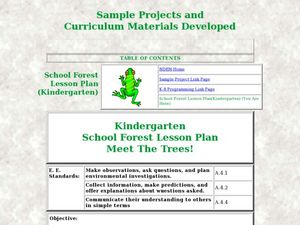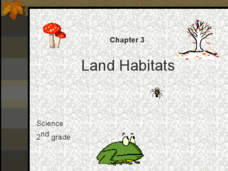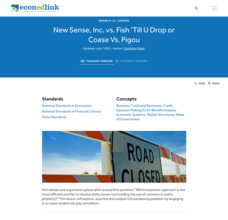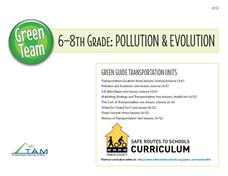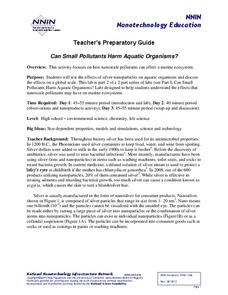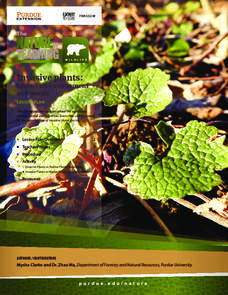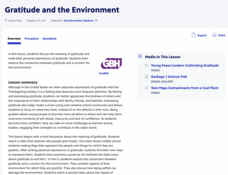Curated OER
Teaching Bioethics
Use this guide for incorporating bioethics into your biology curriculum or for teaching a unit on the topic. A syllabus for an entire year is also available. The resource provides lists of online, video, and printed resources; however,...
Curated OER
Temperature and the Tomato
You will need a photovoltaic system and monitor at your school in order to obtain all of the data required to thoroughly implement this lesson plan. Your class monitors daily temperature and insolation amounts over a two week span of...
Curated OER
What's the Plan?
Is there a higher risk of dying on an intensely hot or incredibly cold day? Explore the effects of extreme weather on human health by reading a short article about a study done to address this question. Since the links in the lesson are...
Curated OER
Meet the Trees!
Pupils investigate their school forest and make their own miniature forest. In this forest investigation lesson, students read The Giving Tree by Shel Silverstein and make alist of reasons to have trees. Pupils investigate trees by...
Curated OER
Workshop: Health Challenge
Learners conduct Internet research in order to better understand the concepts of sustainable health design. In this design and architecture lesson, students gather data and creat a materials kit that responds to the challenges of health...
Curated OER
Energy Conservation Lesson 1: Fossil Fuels and the Ticking Clock
Students explore energy production by participating in a class discussion. In this renewable energy activity, students discuss the differences between solar, coal, wind and fossil fuel energy sources and why some are better for the...
Curated OER
Land Habitats: Grade 3 Science
Build your students scientific vocabulary with this slide show on land habitats. Each slide provides a vocabulary word, image, and definition of a term common to habitats and the environment. Great for science class or as comprehensible...
Curated OER
Oil Well That Ends Well
Focusing on the effect of oil spills on the environment, learners conduct experiments to explore this issue. First, they create an ocean environment using materials provided. Then, they make a simulated crude oil substance from vegetable...
Beyond Benign
Sustainability Bingo
Play a little Bingo and learn a little chemistry. The third installment in a 24-part series gives scholars the opportunity to play a game of Bingo while they review the 12 principles of green chemistry. The principles make up the Bingo...
Just Health Action
What Makes a Community Healthy?
Young people have an opportunity to make it a beautiful day in their neighborhoods with an activity that asks them to identify what is healthy and unhealthy in their community and develop some ideas about what they can do to fix the...
Council for Economic Education
New Sense, Inc. vs. Fish 'Till U Drop or Coase Vs. Pigou
Who is responsible for protecting the environment, and who should pay when it is damaged? The role of government and private industry is complicated. A role-play simulation prompts individuals to decide how to protect a fictitious town...
Safe Routes to School
Pollution & Evolution
Bring together a study of two major scientific topics with a lesson plan on the relationship between pollution and evolution. With the help of a PowerPoint presentation, hands-on activity. and class demonstration young scientists...
PBS
Technology: Conveniences and Consequences
It's a delicate balance—using technology to improve our lives while still protecting the environment, and ourselves, from the hazards of technology use. Class members examine statistics about the increase in media use, complete a survey...
Beyond Benign
The Story of Cosmetics Video Assessment
Does your shampoo contain carcinogens? Scholars learn how cosmetic companies create and market their products, many of which contain toxic chemicals. They examine the bias and consumer responsibilities in the industry.
Kenan Fellows
The Little Stuff Can Make a Big Difference
Great things come in small packages! What better way to illustrate this point than a week-long look at nanotechnology? Earth science scholars explore water quality issues through lab activities, then research new innovations in nanotech...
Curated OER
Selecting the Tap: Water Safety
Examine water as a scarce natural resource instead of taking it for granted. Middle schoolers identify the traits of potable water, and research local water sources to determine if they are impaired or not.
Channel Islands Film
Natural Resources, and Human Uses of Plants and Animals
As part of their study of the restoration projects on Santa Cruz Island, class members demonstrate their understanding of the connections among plant life, animals, and the actions of humans by crafting a model that reveals these...
National Nanotechnology Infrastructure Network
Can Small Pollutants Harm Aquatic Organisms?
Nanoparticles have toxic effects on plant and animal life—even though you can't see them. The second instructional activity of a two-part series has young scientists conduct an experiment that exposes plant and animals to nanoparticle...
Pace University
Grades 6-8 Ecology
Why are our national parks important? Scholars research the national parks and explore the basic ecology of these areas in a differentiated instruction unit on ecology. They learn about ecosystems, food chains, symbiosis, and biomes. The...
Purdue University
Invasive Plants: Impact on Environment and People
It's the attack of the invasive species! Young scientists simulate the behavior of an invasive species with a game-like activity. They assume the roles of native plants, invasive plants, and resources and watch the invasive plant takes...
PBS
Gratitude and the Environment
A class discussion begins a two-part lesson about gratitude and the environment. In part one, learners watch a video then share their feelings about its most memorable moment. Delving deep into the meaning of gratitude, scholars create...
National Institute of Environmental Health Sciences
A Student Exploration of the Impacts of Climate Change on Human Health in the United States
Let the data drive the science. Learners examine data provided in resources to discover connections between climate change and health of vulnerable populations. They study trends and present findings using their choice of projects.
Curated OER
Non-Point Source Pollution Program
Written as field trip preparation to Gateway National Recreation Area, this resource is also appropriate for any class that is studying the impact of human activity on the environment. During the first activity, learners identify...
Curated OER
Chemical Consequences of Burning Fossil Fuels
Future scientists are introduced to the chemical consequences of burning fossil fuels, learning that fossil fuel combustion leads to the formation of oxides of three nonmetals: carbon, nitrogen, and sulfur, all of which end up in the...
Other popular searches
- Environmental Science
- Environmental Resources
- Environmental Health
- Environmental History
- Environmentalism
- Environmental Conservation
- Environmental Issues
- Environmental Awareness
- Environmental Organizations
- Environmental Art
- Environmental Problems
- Environmental Microbiology

